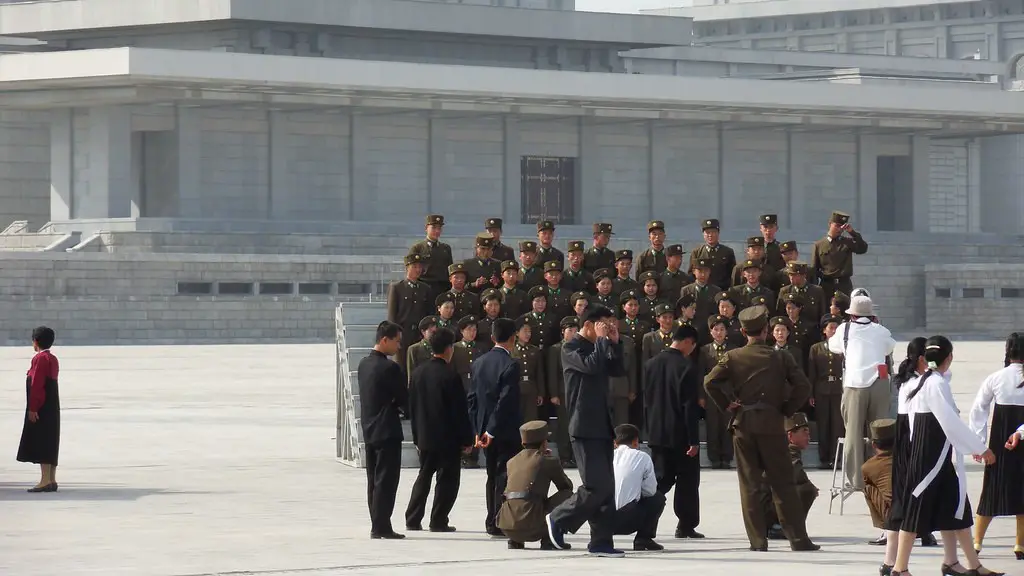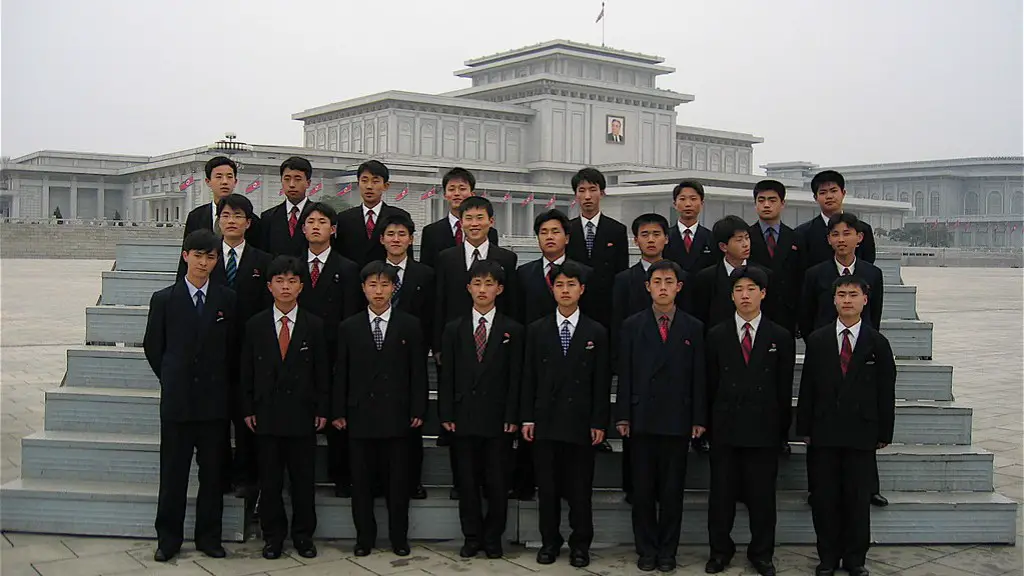For the past several decades, the United States and North Korea have been locked in a Cold War-style conflict, often coming to the brink of thermonuclear war. The two countries have vastly different stances on a variety of political, economic, and social issues, with the U.S. being a global superpower and North Korea being a relatively isolated, secretive nation. The question of which country would “win” in any conflict between the two is often a source of heated debate, as there are varying opinions on the subject from both sides.
One point of contention between the two countries is their respective military strength. While the U.S. military is capable of deploying overwhelming force worldwide and boasts cutting-edge technology and weapons, North Korea’s military power is largely viewed as outdated and less-than-efficient. However, North Korea has recently begun a campaign of nuclear weapon development and has regularly tested intercontinental ballistic missiles, making it clear that they could potentially pose an unprecedented threat to global security.
From a geopolitical standpoint, the U.S. holds a vast advantage over North Korea, largely due to its strong alliances with countries around the world. These alliances give the U.S. access to resources and information that North Korea does not have access to, and this can be used to its advantage in any potential conflict. In terms of economic strength, the U.S. trump North Korea by a significant margin. In 2018, the U.S. had a GDP of approximately $20.5 trillion, while North Korea trails behind with a GDP of just $17.2 billion.
It is widely agreed that, in the event of a military conflict, the U.S. would be the clear victor. While North Korea’s nuclear capabilities cannot be completely discounted, the U.S.’s superior military power and economic strength make it the clear favorite to win any potential conflict. However, many experts believe that North Korea would not back down so easily and would attempt to fight in unconventional ways such as cyber warfare, economic disruption, and propaganda campaigns.
Ultimately, when it comes to conflict between the U.S. and North Korea, the outcome is unclear. While the U.S. is certainly the stronger of the two countries, North Korea’s willingness to take unconventional tactics in order to achieve victory should not be underestimated.
Nuclear Weapons
The most concerning factor in any potential conflict between the United States and North Korea is the possibility of nuclear war. North Korea has been stockpiling nuclear weapons over the past several years, and while there are no reliable estimates on the exact number, it is believed the country may have as many as two dozen weapons. This is a significant increase from the five nuclear tests the country conducted between 2006 and 2017.
The U.S. is also a nuclear power, with an estimated 6,800 nuclear warheads. However, North Korea’s proximity to the U.S. and its extensive nuclear arsenal make it a particularly dangerous opponent. In addition, North Korea’s lack of transparency regarding its weapons program and the regime’s stated willingness to use nuclear weapons makes it a serious threat, regardless of the U.S.’s superior military power.
Experts agree that the most likely outcome of any U.S. conflict with North Korea would be a nuclear war. As such, it is important for the U.S. to take serious steps to de-escalate the situation and to negotiate a peace treaty with North Korea. U.S. President Donald Trump has met with North Korean leader Kim Jong Un on several occasions, and there have been some reports of progress in negotiations between the two countries. However, it remains to be seen whether such talks will lead to a lasting peace between the U.S. and North Korea.
Alliances and Diplomacy
Another potential advantage the U.S. has in any potential conflict with North Korea is its strong alliances with other countries. The U.S. is a member of NATO and has a number of mutual defense treaties with other countries, most notably Japan and South Korea. These countries could potentially be drawn into a conflict with North Korea if the situation were to become hostile.
The U.S. has also been successful in rallying international support for sanctions on North Korea, in an effort to force the regime to abandon its nuclear weapons program. The sanctions have been somewhat successful in curtailing the regime’s abilities, and have drawn condemnation from the international community.
The U.S. has also been successful in convincing China to take a more active role in exerting pressure on North Korea. China is a close ally of North Korea and has been instrumental in persuading the regime to consider pursuing a diplomatic solution to the issue.
It is clear that diplomatic avenues are the key to avoiding a conflict with North Korea, as it is unlikely that the U.S. or North Korea would win in a military conflict. As such, the U.S. has been successful in rallying international support and applying diplomatic pressure on North Korea in order to push the regime to pursue a peaceful solution.
Political Impact
An armed conflict between the U.S. and North Korea would have a far-reaching effect on global politics. It could potentially lead to a series of proxy wars in Asian countries, as North Korea’s allies could be drawn into the conflict. It could also disrupt the global economy, as any military escalation would likely have a negative effect on global trade and markets.
Meanwhile, the political ramifications for the U.S. could be serious. An armed conflict would be a political disaster for the Trump administration, and could potentially lead to impeachment proceedings against the president. It would also likely disrupt the 2020 presidential election, as any conflict with North Korea would likely become a key issue in the election season. Furthermore, a conflict with North Korea could significantly weaken U.S. standing in the international community.
It is clear that any armed conflict between the U.S. and North Korea would have far-reaching implications for global politics. As such, it is essential for the two countries to pursue diplomatic and peaceful solutions in order to avoid an escalation of the situation.
Civilian Impact
Perhaps the greatest concern about the potential for conflict between the U.S. and North Korea is the effect it would have on civilians in both countries. In the event of an armed conflict, civilians on both sides could potentially become victims of the violence and destruction. Civilians in North Korea, in particular, could bear the brunt of the suffering, as they have already been subject to significant human rights abuses and economic deprivation under the regime.
In the event of a conflict, civilians in South Korea and Japan would also be at risk, as both countries are currently facing a potential nuclear threat from North Korea. The potential for catastrophic casualties in both countries is a significant concern, and is one of the primary reasons why the U.S. is encouraging diplomacy rather than military action.
It is clear that any conflict between the U.S. and North Korea would have a devastating effect on civilians in both countries. This should be taken into consideration when assessing the potential outcome of any armed conflict between the two countries.
Economic Impact
An armed conflict between the U.S. and North Korea could have a significant economic impact on both sides. The U.S. economy would likely face significant disruption, as any military action could have a negative effect on global markets. Furthermore, the cost of any conflict would likely be immense, as the U.S. would incur significant expenses in terms of military equipment and personnel.
Meanwhile, the North Korean economy would likely collapse if the regime were to engage in a conflict with the U.S. The country’s already weak economy would be decimated by the cost of any military action, and its dependence on foreign aid and trade would be drastically reduced. The consequences of such a collapse could be far-reaching, as it would likely lead to widespread poverty and suffering in North Korea.
It is clear that any conflict between the U.S. and North Korea would have grave economic consequences for both countries. As such, it is essential for both sides to consider the economic ramifications of any potential conflict and to take serious steps to engage in diplomatic negotiations and de-escalate the situation.
Conclusion
Ultimately, any conflict between the U.S. and North Korea would be catastrophic for both sides. The U.S. holds a clear tactical, geopolitical and economic advantage, but the risk of nuclear war is a major concern. On the other hand, North Korea’s willingness to use unconventional tactics in order to gain an advantage should not be discounted. As such, it is essential for both sides to pursue diplomatic solutions and to take serious steps to avoid a conflict.





